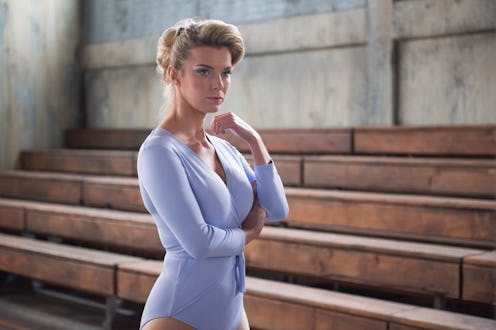Entertainment
'GLOW' Takes Women Seriously Even When Society Doesn't

Sure, Netflix's wrestling dramedy series GLOW emphasizes the physical power of women's bodies, but it also addresses the importance of viewing women's professional roles as valid. (Look out for spoilers for GLOW Season 1!) For Debbie Eagan, played by Betty Gilpin, the metamorphosis from soap opera actress to wrestling star is complicated by her husband’s refusal to acknowledge her talent. Debbie’s husband, Mark (Rich Sommer), sees her role in the Gorgeous Ladies Of Wrestling as “silly” despite how important it is to her. As they watch the first televised match of the show, she realizes this disdain was also directed at her time on the soap opera Paradise Cove. In other words, nothing she has done professionally is deemed as important.
Despite her husband's clear disapproval, Debbie’s decision to join her fellow athletes in the ring is the act of a woman discovering her own agency. Suddenly, Mark's rejection of the female wrestling show simply because it’s female aligns with the gendered language and expectations that separate how men and women are seen in specific professional roles.
While Debbie’s marital strife is an important part of Season 1, GLOW also emphasizes how hard women need to work to be taken as seriously as their male counterparts. The idea that feminine activities or female job titles are less than their masculine counterparts has to do the gendered language often attributed to these roles. Through language influence alone, any feminine activity loses its power whereas the male activity can continue unchanged.
The term “female wrestling” automatically suggests that male wrestlers are seen as the experts — their event is just called "wrestling" — and women as the constant novices. While the title “Gorgeous Ladies Of Wrestling” could indicate an empowering view of women in physical roles, it could be problematic in its emphasis on the gender and appearance of its athletes.
The Daily Mail references the work of Magdalena Formanowicz who stated, “Feminizing language helps make women more visible and more salient, but apparently this is not always an advantage. Emphasizing femaleness with a feminine title may lower the evaluation of women in a professional context."
In her opinion piece for The Guardian, Arwa Mahdawi addresses “girlboss” and “SheEO” as terms that complicate women's roles in leadership. While she acknowledges that “boss” and “CEO” are culturally coded to be seen as a male presence, feminizing the language isn’t helpful either. Mahdawi explained, "Language reflects and reinforces social norms; ungendering language is an important part of solving sexism."
As Liberty Belle, the star of GLOW, Debbie’s biggest struggle is redefining her identity when she enters this new space. In the beginning of the series, she has difficulty coming to terms with going back to work as a single mother, but quickly works out a system where her parents watch her son. GLOW has given Debbie back control over her life. When her husband discovers her first show, her moment of triumph is diminished. Mark is horrified. Referring to her as “trailer park,” he sneers, “You put your name on this trash?”
Her husband’s disdain is directed toward his wife wrestling, not the sport itself, referring to GLOW as "girl-on-girl wrestling." This phrase fetishizes the sport, indicating that male wrestlers are athletes while female wrestlers are in the ring to serve the male gaze. Using this language, the dedication and hours of practice put into female wrestlers' routines — and Debbie's hard work specifically — are ignored.
There's a fantastic moment in Season 1 where Debbie, Carmen, and Melrose go to a men's wrestling show for research purposes. Debbie, who has never seen a wrestling match before, is still struggling with selling the camp of wrestling. However, when she discovers that the wrestling storylines are similar to soap operas, which is obviously in her wheelhouse, she becomes a convert. Suddenly, she realizes that her role on Paradise Cove was not the best she'll ever have. As Liberty Belle, she now has the opportunity, on her own terms, to change the way audiences see her.
While attending the men's wrestling show is a powerful epiphany for Debbie, there's also a clear indication of how audiences view male wrestlers. At this match, the seats are sold out, which contrasts with how hard the women must work to find people to attend their shows. The audience participates actively, without having to be prompted as they do at the GLOW shows.
This treatment extends beyond the GLOW universe and into the real world of wrestling as well. Heather Bandenburg wrote for The Guardian, "Wrestling is also a notoriously tough industry to be in, requiring intense training and the mastery of dangerous manoeuvres. As in a lot of art forms, women are not usually the big names on the bill. A lot of people still call women’s bouts the 'piss break' because they care so little. Slut-shaming is standard practice, as are body-monitoring and trolling."
Mark's lack of respect for Debbie's wrestling career makes it difficult for him to view her triumph in this field as successful. He interprets her embracing the persona of Liberty Belle as being similar to his affair with Ruth — it's a minor transgression, a moment of weakness, and they will both be forgiven and return home to their family life eventually.
But in the finale of Season 1, Debbie stands up from the audience to join Ruth in the ring, and it's clear this is what she has planned all along. She turns to her husband and tells him, "If this is too silly for you, you can leave." Liberty Belle joins the ring, leaving her husband holding her coat.
In Debbie's transformative journey, GLOW shows that women don't need to be made to feel secondary to their male counterparts in any field. Although wrestling thrives on entertainment, soapy storylines, the stakes are still high for a woman who desperately needs to reclaim her power.